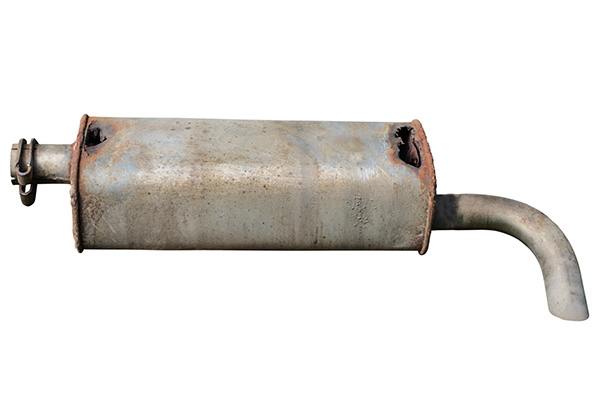
Many drivers brush off an exhaust leak as just an annoying sound. Maybe it’s a ticking or popping noise when the engine starts, or a deep growl when accelerating. But the truth is, exhaust leaks can lead to much more than irritating sounds. They can reduce engine performance, increase emissions, and in some cases, expose you and your passengers to harmful gases.
If left untreated, what starts as a small leak can turn into a serious safety issue, not to mention expensive repairs down the road.
What Is an Exhaust Leak
Your exhaust system is designed to route engine gases safely away from the engine and out the back of the vehicle. It includes the exhaust manifold, catalytic converter, resonator, muffler, and a network of pipes that carry gases through the system.
An exhaust leak occurs when there’s a crack, hole, or failed gasket anywhere along this path. Instead of flowing smoothly through the system, gases escape into areas where they shouldn’t be — under the hood, into the cabin, or out through damaged piping under the car.
How an Exhaust Leak Affects Safety
One of the most dangerous risks of an exhaust leak is carbon monoxide exposure. Carbon monoxide is colorless, odorless, and extremely toxic. A properly functioning exhaust system keeps it out of your cabin. But if gases start leaking near the firewall or floorboards, even small amounts can enter the passenger area, especially while idling in traffic or when driving with windows up.
Symptoms of mild carbon monoxide exposure can feel like fatigue or headache. Continued exposure can result in dizziness or nausea. This is why it’s critical to investigate any sign of a leak immediately.
Reduced Engine Efficiency and Fuel Economy
When your exhaust system is leaking, the engine loses backpressure, which disrupts the air-fuel ratio. This imbalance causes your engine to work harder to compensate, burning more fuel in the process. You may notice your MPG starts to drop for no clear reason, or that the vehicle hesitates during acceleration.
In severe cases, a leak before the oxygen sensor can throw off your vehicle’s computer readings, causing poor combustion and even misfires. The check engine light often follows.
Noise Is Often the First Warning Sign
Louder-than-normal engine noise is a classic sign of a leak. It often starts off subtly but gets progressively louder. If the leak is near the exhaust manifold or downpipe, you may hear a ticking sound right after starting the car, especially when it’s cold.
This sound might settle down slightly as the metal heats up and expands, temporarily sealing the crack, but that’s only masking the issue. A professional inspection can reveal exactly where the noise is coming from.
Vibration and Smell Are Also Common Clues
In some cases, you may feel unusual vibrations in the steering wheel, gas pedal, or floorboards. This happens when the exhaust system is damaged or has separated at a joint. That movement, combined with the smell of exhaust fumes, is another sign the system needs immediate attention.
While exhaust fumes are hard to miss, remember that not all dangerous gases are easy to detect. That’s why even a faint odor inside the cabin should be taken seriously.
Common Causes of Exhaust Leaks
Rust is one of the biggest culprits, especially in areas with high humidity or road salt in winter. Over time, moisture accumulates in the exhaust system, causing the metal to weaken and crack. Loose or broken hangers can also let pipes sag, pulling on joints and causing leaks.
Accidental impacts, like scraping a speed bump or curb, can also create small holes or stress fractures in the piping. In older vehicles, gaskets between the manifold and cylinder head can wear out and allow leaks to form.
Fixing a Leak Early Saves Money
Repairing an exhaust leak is usually much cheaper than replacing larger portions of the system. If caught early, a damaged gasket or small hole in a pipe can be patched or replaced quickly. But ignoring the issue allows it to spread, possibly requiring a full muffler, catalytic converter, or manifold replacement.
Even worse, continued exposure to heat and vibration can damage nearby sensors and wiring, adding more time and cost to the repair.
Get Peace of Mind at Bud’s Auto Repair & Transmission in Marysville, WA
If your car is making strange noises, smells like exhaust inside, or feels like it’s losing power, bring it to Bud’s Auto Repair & Transmission in Marysville, WA. Our team can inspect your full exhaust system, locate the source of the leak, and make the right repairs to protect your safety and your engine.
Don’t take chances with harmful gases — schedule your exhaust inspection today.